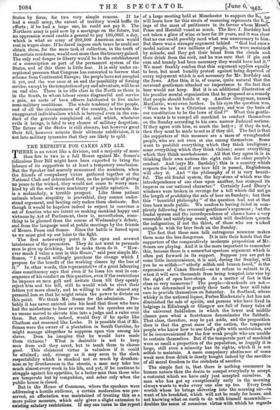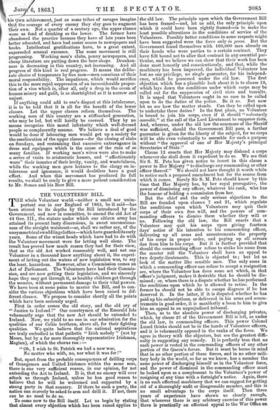THE REPRIEVE FOR CAKES AND ALE. T HERE is no retort
like a division, and a majority of more than five to two in a full House against Mr. Somes's ridiculous Beer Bill might have been expected to bring the labours of its supporters to at least a temporary conclusion. But the Speaker had scarcely announced the numbers, when the friends of compulsory virtue gathered together at the National Club and determined that, on the principle of giving no peace to the wicked, they would not cease to worry man- kind by all the well-worn machinery of public agitation. It is a melancholy, a terrible prospect. Like those patient animals whose stupidity is proverbial, they cannot under- stand argument, and beating only makes them obstinate. But though it would be hopeless indeed to expect to convince a set of fanatics who are intent on making mankind happy and virtuous by Act of Parliament, there is, nevertheless' some- thing to be gleaned from the course of Wednesday's debate, and from the language used at public meetings by the friends of Messrs. Pease and Somes. Since the battle is forced upon us we must gird up our loins to the fight. The first noteworthy point is the open and avowed intolerance of the promoters. They do not want to persuade men to give up drinking, but to make them do it. "How- ever much I value a seat in this House," said poor simple Mr. Somes, "I would willingly purchase the change which I propose for the benefit of the working classes by the loss of it.' In other words, this representative of a great labouring class constituency says that even if he loses his seat in con- sequence of his conduct on this question, even if the restrictions he imposes on men gall and irritate them till they openly reject him and his bill, still be would wish to rivet their fetters yet more closely, and be willing to suffer almost any personal loss so that he might retain the power to dictate on this point. We thank Mr. Somes for the admission. Pro- bably it has never entered into his head that those who have had the misfortune to hear or even read his speeches are by no means moved to elevate him into a judge and a ruler over them. But neither, indeed, would they if he spoke like Chatham and reasoned like Locke. It is possible that if Mr. Somes were the owner of a plantation in South Carolina, he might manage altogether to suppress open vice among his slaves. Does he imagine that he would have made them virtuous? What is desirable is not to keep men from evil they covet, but to teach them to choose good. This cloistered virtue is valueless if it could be attained; and, strange as it may seem to the sleek respectability which is shocked not so much by drunken- ness as by drunkenness in the streets, a man may take too much almost every week in his life, and yet, if he continue to struggle against his appetites, be a better man than those who are temperate but by compulsion, and sober only when the public house is closed. But in the House of Commons, where the speakers were addressing a hostile audience, a certain moderation was pre- served, an affectation was maintained of treating this as a mere police measure, which only gives a slight extension to existing salutary restrictions. If any one turns to the report of a large meeting held at Manchester to support the will learn how far this strain of reasoning represents the fk„,,T, ings of the mass of petitioners in its favour whom Messig, Pease and Horsfall vaunt so much. The Rev. J. Bardsley had not taken a glass of wine or beer for 29 years, and it was clear that no one could possibly need what was unnecessary to him. But there was a stronger argument behind. "God had once a model nation of two millions of people, who were sustained by miracle, and they got their bread from the clouds and, their drink from the rock, and he was sure that if gin and rum and brandy had been necessary they would have had it." We Must frankly confess that this argument applies equally to beer, but must humbly protest against being deprived of every enjoyment which is not necessary for Mr. Bardsley and the Jews. After this, it is, of course, quite natural that the reverend gentleman attached no importance to the fact that beer would not keep. But it is an additional illustration oE his peculiar mental organization that he proposed as a remedy that people should bottle it up. Another clergyman, named MacCartie, went even further. In his eyes the question was, "'Were we to be a Christian country, and was the basis of our constitution to be the laws of God ?" What this gentle- man wants is to compel all mankind to conduct themselves. on the Sunday according to his own narrow Judaical notions. If they agree with him, so much the better; if they do not,. then they must be made to act as if they did. The fact is that the supporters of this measure are a mass of wrongheaded people, who are not even at one among themselves. Some want to prohibit everything which they think irreligious ; some everything which they think vicious; some everything, which they think unwholesome. All that they agree in is in thinking their own notions the right rale for other people's conduct. And (says Mr. Bardsley) this is a country which respects the law, and if our beer bill is passed, Englishmen will obey it. And "the philosophy of it is very beauti- ful. The old feudal system, the key-stone of which was the- interdependence of one class upon another, has stamped its impress on our national character." Certainly Lord Ebury's windows were broken in revenge for a bill which did not go. the length of prohibiting the sale of beer on Sundays; but then this "beautiful philosophy" of the question had not at that time been made public. We confess to having failed in com- pletely following the reverend gentleman's argument; hut the feudal system and the interdependence of classes have a very venerable and satisfying sound, which will doubtless quench the indignation, if not the thirst, of those who are Ns icked enough to wish for beer fresh on the Sunday. The fact that these men talk outrageous nonsense makes. them none the less dangerous. It is into their hands that the- supporters of the comparatively moderate proposition of Mr.. Somes are playing. And it is the more important to remember this, because there is a somewhat specious argument which is often put forward in its support. Suppose you are put to- some little inconvenience, it is said, during the Sunday, will you be so selfish—" utterly selfish and brazen-faced," is the- expression of Canon Stowell—as to refuse to submit to it, when it will save thousands from being tempted into vice by the sight of open beer-shops. As a matter of fact is this. class so very numerous? The people—drunkards are not— who are determined to gratify their taste for beer will take care to provide themselves on Saturday. In Scotland, where. whisky is the national liquor, Forbes Mackenzie's Act has not diminished the sale of spirits, and persons who have lived in, lodgings in Edinburgh or Glasgow are full of funny tales of the universal fuddledom in which the lower and middle. classes pass what a Scotehman denominates the Sabbath.. That class, therefore, may be put aside, and the proposition then is that the great mass of the nation, the temperate people who know how to use God's gifts with moderation, arei to be inconvenienced for the few weak people who are unable to restrain themselves. But if the temperate part of mankind were as small a proportion of the population, as happily it is large, still even a minority has its rights, which it is not selfish to maintain. A mere compulsory abstinence of some- weak men from drink is dearly bought indeed by the sacrifice- of all moral freedom to the crotchets of ascetics.
The simple fact is, that there is nothing commoner in human nature than the desire to compel everybody to accept a restraint which we have only just accepted ourselves. A man who has got up exceptionally early in the morning always wants to wake every one else up too. Every fresh wretch whom he brings shivering into the morning air—in want of his breakfast, which will not be ready for hours. and not knowing what on earth to do with himself meanwhile— doubles the sense of conscious virtue with which he regards his ciWn achievement, just as some tribes of savages imagine ths.it the courage of every enemy they slay goes to augment their own. Not a quarter of a century ago, the upper classes were as fond of drinking as the lower. The former have abandoned the practice because they have of late years been better educated, and have had easier access to newspapers and books. Intellectual gratifications have, to a great extent, superseded sensual excesses. The same movement is still progressing. Working men's clubs, penny newspapers, and cheap literature are putting down the beer-shops. Drunken- ness is decreasing in this country, not increasing. And all progress of this kind is real progress. It means the delibe- rate choice of temperance by free men—men conscious of their moral responsibility. The impatience, which would sacrifice this to the more rapid suppression of an inconsiderable propor- tion of a vice which is, after all, only a drop in the ocean of human misery and guilt, is as shortsighted as it is narrow and unj ust. If anything could add to one's disgust at this intolerance, it is to be told that it is all for the benefit of the lower classes. Let the upper classes reform themselves. The working men of this country are a stiffnecked generation, who may be led, but will hardly be coerced. They by no means recognize this moral inferiority which well-dressed people so complacently assume. We believe a deal of good would be done if labouring men would get up a society for the amelioration of the upper classes.—for the closing of clubs on Sundays, and restraining that excessive extravagance in dress and equipages which is the cause of the ruin of so many families. If working men's wives were also to make a series of visits to aristocratic houses, and "affectionately warn" their inmates of their levity, vanity, and wastefulness, while the working men gave lectures to the clergy on in- tolerance and ignorance, it would doubtless have a good effect. And when this movement has produced its full results, we shall be ready to give a more patient consideration to Mr. Somes and his Beer Bill.































 Previous page
Previous page